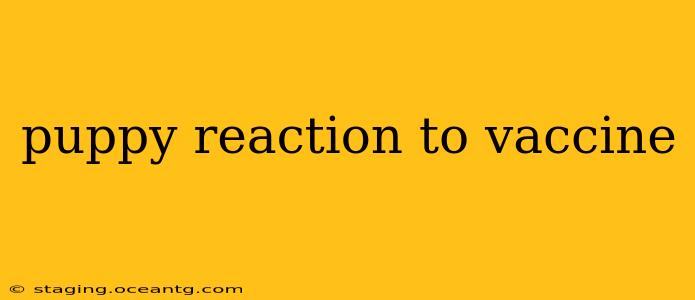Bringing home a new puppy is an exciting time, filled with playful cuddles and endless adventures. However, responsible pet ownership includes ensuring your furry friend receives the necessary vaccinations to protect them from various diseases. While vaccines are crucial for your puppy's health, understanding potential reactions is vital for responsible pet parenting. This guide will address common concerns and provide valuable information to help you navigate this important stage in your puppy's life.
What are the common reactions to puppy vaccines?
Most puppies experience minimal side effects after receiving their vaccinations. However, some might show mild reactions. These usually include:
- Lethargy: Your puppy might seem less energetic than usual for a day or two.
- Loss of Appetite: A temporary decrease in appetite is also common.
- Mild Fever: A slightly elevated temperature is possible, usually resolving within 24 hours.
- Soreness at the Injection Site: The area where the needle was inserted might feel tender to the touch, causing some discomfort. This typically subsides within a few days.
- Swelling at the Injection Site: A small lump or swelling at the injection site can occur. This usually resolves on its own, but you should monitor it.
How long do vaccine reactions last in puppies?
The duration of vaccine reactions varies greatly between puppies. Most mild side effects, such as lethargy or soreness, will resolve within 24 to 48 hours. More severe reactions are less common and require immediate veterinary attention. If you notice any concerning symptoms lasting longer than a couple of days, consult your vet.
When should I be concerned about my puppy's reaction to a vaccine?
While mild reactions are expected, certain symptoms warrant immediate veterinary attention. These include:
- Severe Lethargy or Weakness: If your puppy seems unusually weak or unresponsive.
- High Fever: A significantly elevated temperature (consult your vet for the specific temperature threshold).
- Vomiting or Diarrhea: Persistent vomiting or diarrhea that doesn't subside.
- Swelling beyond the Injection Site: Extensive swelling or swelling that continues to grow.
- Difficulty Breathing: Any signs of respiratory distress are a serious concern.
- Hives or Rash: An allergic reaction might manifest as hives or skin rash.
- Seizures: This is a very serious symptom requiring immediate veterinary attention.
What can I do to help my puppy after a vaccine?
Providing a comfortable and supportive environment is key:
- Rest: Let your puppy rest quietly and avoid strenuous activity.
- Hydration: Ensure your puppy drinks plenty of water.
- Gentle Care: Handle your puppy gently, avoiding the injection site.
- Monitoring: Carefully monitor your puppy for any unusual symptoms.
My puppy seems fine, should I still monitor them?
Yes, even if your puppy seems perfectly fine after the vaccination, it's still important to monitor them for at least 24-48 hours. While most reactions are mild and temporary, early detection of any unusual symptoms allows for prompt veterinary intervention.
Are there any specific breeds that react more strongly to vaccines?
There's no definitive evidence suggesting that specific breeds react more strongly to vaccines than others. However, individual sensitivities can vary, even within the same breed. It's important to observe your puppy's reaction regardless of their breed.
What should I do if my puppy has a severe reaction?
If you notice any of the severe symptoms mentioned above, contact your veterinarian immediately. Do not hesitate to seek veterinary care if you're concerned about your puppy's well-being. Timely intervention is crucial in managing severe vaccine reactions.
This information is for general knowledge and should not be considered a substitute for professional veterinary advice. Always consult your veterinarian with any questions or concerns regarding your puppy's health and vaccinations. They can provide personalized recommendations based on your puppy's specific needs and medical history.
